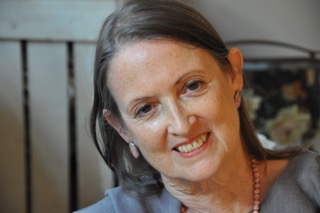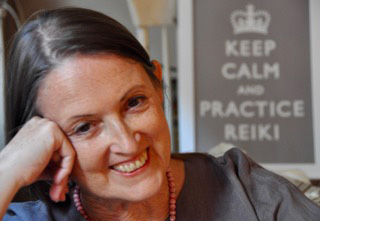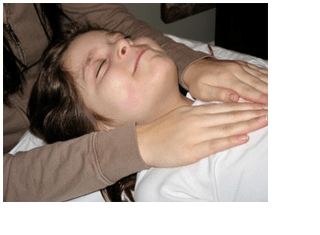Let me know if you want to be informed as I schedule more traditional Reiki classes.
Here’s how you can learn Reiki self practice safely during this time of heightened need for self care.
One of the best things I ever did was learn to practice Reiki. — Andrea Eisenman
 NYC FIRST DEGREE REIKI CLASSES
NYC FIRST DEGREE REIKI CLASSES
with Pamela Miles
Current classes are listed here.
My classes are currently given in live, small group, interactive videoconference sessions so you can learn self Reiki practice from the comfort of your own home. I’ve been teaching in this format since January 2019 and found that my students who learn from home are every bit as engaged in practice as in-person students.
Traditional Reiki self practice brings peace to every day
Imagine being able to reconnect with your timeless peaceful core, every day, any time of the day. How much difference would it make to be able to return to yourself quickly, seamlessly, in the midst of any challenge, with just the light touch of your hand?
Learn to practice traditional Reiki self care and you’ll quickly feel better, and function better. That’s so important because when you feel better and function better, you’ll literally have more time in your day, and you’ll make better choices — ones that help you continue feeling better and functioning better.
Helping those you love by helping yourself
Give yourself this gift of healing self care, and you truly give a gift to everyone else in your life at the same time. No matter how you might try to hide it, the people who love you are aware of how you’re feeling.
Good news! It takes only about 10 class hours over a few days to learn the basics of traditional First degree Reiki practice. More good news! That’s all the training you need to continue bringing yourself back to yourself at the touch of your hand.
Why traditional Reiki?
I teach the simple traditional Reiki practice I learned in 1986, Reiki practice as it was taught by Hawayo Takata, the Reiki master who brought Reiki practice to the U.S. from Japan in the 1930s. That simple, accessible, doable practice is not so easily found these days.
Like other spiritual practices such as meditation, yoga, qigong, Reiki practice is completely unregulated. And personally, I feel strongly that’s how it should be. Reiki is a home self care practice. But lack of regulation opened the door to changes being made by people who hadn’t practiced Reiki long enough to what — if any — changes were actual improvements instead of complications or dilutions. And Reiki practice was picked up by the New Age movement, even though the traditional practice is not at all New Age.
So it’s up to you to make an informed choice about the Reiki training that’s right for you.
I teach traditional First degree Reiki (also called Level 1) classes in New York City each month. If the timing above doesn’t work for you, sign up here, check First degree classes, and I’ll let you know as future classes are scheduled.
The focus of traditional First degree Reiki training is self-practice, and you will begin practicing an hour into our first session. By the time the class ends, you’ll feel confident about your ability to practice and bring more balance and ease to your life.
I feel so fortunate to be trained by you — someone who has deep respect and commitment and an amazing sense of humor, which makes it all so much fun, too! You put care, attention, and warmth into every moment of our time together, making the experience so incredibly special. You are a true master teacher and advocate. — Sue S.
Are you already practicing Reiki but want more support and confidence? You are welcome to join a First degree class. If you approach the class as a beginner, the experience will clarify your understanding and deepen your practice. I also offer various Reiki continuing education classes.
I want to express my tremendous gratitude for last week’s Reiki training. It was truly a wonderful experience and will have lasting reverberations in my life. What a gift! — Kristin Wynn-Paige
TRADITIONAL FIRST DEGREE REIKI TRAINING
Traditional Reiki is easy to learn and easy to practice. I live in New York City, where the pace of life goes from busy to busier, but even my busiest students easily find time for Reiki self-treatment everyday.
Why is it so easy? Because you can practice traditional Reiki self-treatment in bed as you fall asleep or wake up, or at any other time that is convenient for you, even while you are doing something else. Interested? Read on.
You’ll begin practicing Reiki self-treatment soon after our First Degree class starts, and you’ll leave the training fully empowered to practice Reiki on yourself, and to share treatment informally with family, friends, and pets.
Your teaching was so generous, clear, supportive, and passionate. I am beyond grateful I found you. And the continuing support is so lovely! — Kate Donovan
 It’s all about balance
It’s all about balance
Practicing Reiki self-treatment restores balance on every level, physically, mentally, emotionally, and spiritually. When you live with greater balance in yourself, your relationships with others and with the circumstances of your life generally improve as well, including job and money.
That makes sense, doesn’t it? The more balanced we are, the more present we are to enjoy being ourselves, and to appreciate the people around us and the details of our lives, yes even that co-worker who grates on the nerves.
We make better choices when we are balanced, so making a move to restore balance tends to snowball and bring us — you guessed it — more balance, ease and alignment. This shows up differently for different people because we are all individuals in different states of imbalance — and it’s all changing constantly.
But one thing is for sure — you won’t have more balance in your life until you make it a priority. Traditional Reiki self practice makes self care as easy as possible and helps you feel better, clearer, more comfortable in your skin.
Your traditional Reiki class is the beginning…
 You will learn protocols for self-treatment and for practicing Reiki with others, and we will discuss how Reiki supports your wellness and your medical care, the philosophy and history of Reiki practice, and the Reiki Precepts.
You will learn protocols for self-treatment and for practicing Reiki with others, and we will discuss how Reiki supports your wellness and your medical care, the philosophy and history of Reiki practice, and the Reiki Precepts.
Continuing to practice Reiki self-treatment consistently, every day, over a period of time, is how you really come to understand Reiki, and to reap the greatest benefits: improved wellness, greater happiness, health promotion, disease prevention, and an enhanced sense of meaning in life.
First Degree Reiki training is where everyone begins, even if you are planning to become a professional. You are welcome to take a First degree class even if you are already trained to practice Reiki. Whether you are a First degree, Second degree or Reiki master practitioner, the class will deepen your practice and your understanding. (I also offer Reiki professionals classes to strengthen your practice, build your clinical skills, and raise your professionalism under Reiki Continuing Education.)
My First Degree classes are either on three weekday evenings or Friday evening and all day Saturday.
The number of students in each class is limited to ensure ample time to ask questions and share your experience.
Traditional Reiki practice and family wellness
Want to give your family the gift of wellness?
Families who practice traditional Reiki are empowered to take responsibility for their happiness and health. Practicing Reiki engages families in a culture of wellness and health promotion, that fundamental health care starts at home.
Children can learn to practice traditional Reiki and enjoy sharing it with others. Let’s talk about how best to bring Reiki practice to your family.
I am also available to teach at your workplace or organization. Let’s customize a Reiki class to best serve your needs.
While receiving a brief sample of Reiki touch at an information session Pamela gave, I instantly connected with Reiki’s deep comfort and potential for healing. I was quite burnt out, having just moved to NY after spending three years in Colombia and Africa in humanitarian aid work.
After taking the First Degree class with Pamela and practicing self-treatment for a couple of months, I had greater resistance to stress, and felt less fatigued, more clear and able to concentrate on building a healthy eating, exercise and life routine that till then had felt beyond my reach.
I came to Reiki hoping to alleviate a lifelong hormonal imbalance, depression, weight gain, the stress of constant travel for work, the strain of living far from home and family, and I see significant improvement in all those areas.
— Paula L.
Reiki practice is balancing to the individual, so it can help in any situation. Even when Reiki practice is not all that is needed, it is a good place to start, because you’ll notice improvement quickly.
Once you start feeling better, you are better able to address any changes that need to be made. Reiki practice also helps balance the side effects of needed medical treatments.
These real life Reiki stories shared by people like you give examples how Reiki practice has helped other people address a wide range of challenges.
Looking for Second degree Reiki training or Reiki master training?
IMPORTANT REIKI CLASS DETAILS — please read:
All sessions start promptly; ending time is approximate.
You will begin practicing Reiki on yourself during the first session. It is necessary to attend all sessions in their entirety.
We have limited spaces in each class. A nonrefundable, nontransferable deposit of $165 reserves your space. The balance is due before we begin class. All classes are on the Upper West Side of Manhattan. We’ll email you the precise location after you register.
Please purchase a copy of my book, REIKI: A Comprehensive Guide, before class, either here or at your local bookstore. It is not necessary to read it cover to cover before class, but do read the introduction and first chapter, and browse the contents. The book will become a supportive companion to your continuing practice. It’s best not to do any other reading before class.
Would you like to arrange a class for your family, friends or business? Email me and let’s talk about it.
I look forward to teaching you to easily restore balance to yourself and your life, so you can be happier and healthier.
FIRST DEGREE REIKI TRAINING FAQs
Q. What will I actually do during my First Degree Reiki class?
A. You will start practicing self Reiki as soon as we finish introducing ourselves. The core of traditional Reiki training is a series of initiations that empowers you to practice, and I give the first of four initiations an hour or so after the class begins. Initiation can be understood as subtle, targeted healing offered by a qualified Reiki master. Traditional Reiki initiation enables you to connect spontaneously with your pristine inner core of wellness, no matter how ill or unbalanced you are at any moment. Mikao Usui started the Reiki initiation lineage in Japan in the 1920s. I am five generations from Usui in his Reiki master lineage.
Q. Will I have homework?
A. Yes, you will — to practice at home as much as you can. I know you’re busy, but you’ll find this surprisingly easy to do.
By now you’ll be intrigued enough by your new Reiki hands to look forward to practicing at least 20 minutes each day, which most students do in bed, while falling asleep or upon awakening. You’ll also find moments in your day to connect with the refreshing presence of your Reiki hands. In the midst of a stressful day, even a minute of one hand placed unobtrusively on your body can make a difference in how you feel.
As you practice on your own and notice both the delightful sensations that often accompany a Reiki treatment and an overall lift in well-being, your confidence and motivation will grow. This is important, because continuing to practice everyday is how you get the most benefit from Reiki, and how your understanding of Reiki practice deepens over time.
Q. Do students really feel that they are able to practice after this training?
A. By the time the class ends, students have logged in hours of traditional Reiki self practice both in class and at home, and are enthusiastic about the benefits they’re experiencing. Reiki practice brings a sense of comfort and students are delighted by their daily practice.
The most challenging part of Reiki practice is appreciating just how easy it is to practice. This is not a skill-based practice; students are literally empowered to practice. The ability to practice Reiki a gift received during traditional training.
We don’t have to work at receiving the gift of traditional Reiki practice; we just have to show up. The way we show up is by practicing self Reiki regularly. As renowned yogamaster Pattabhi Jois famously said, “Practice, and all is forthcoming.” True for practicing yoga, and true for practicing Reiki.
The second most challenging part of Reiki practice is understanding the importance of daily practice. Daily, as in every day.
It’s as if a great benefactor wants to give you a fortune, but that fortune is too big for you to receive all at once; you can only receive its fullness gradually, by practicing daily self-treatment.
Students often mistakenly take another, higher-level class to advance their abilities, but traditional Reiki is primarily developed through practice. Most people only need First Degree training to practice Reiki effectively for the rest of their lives.
Q. Any follow-up? Do your students have continuing contact with you?
A. Yes, it is helpful for students to have continuing support as they choose. I offer my students several avenues of support to meet their diverse needs. Most importantly, I create in-person community at my public monthly JCC Reiki clinic where we practice together, share experiences and discuss questions, and special practice sessions and reunions open to my students only.
My book REIKI: A Comprehensive Guide is a practice guide that students keep handy and refer to over and over. I am personally available to my students through email and offer online support on my blog and facebook page, as well as Reiki continuing education programs.
Students bond easily during classes, and I encourage them to continue sharing Reiki treatment with one another on their own after our class ends.